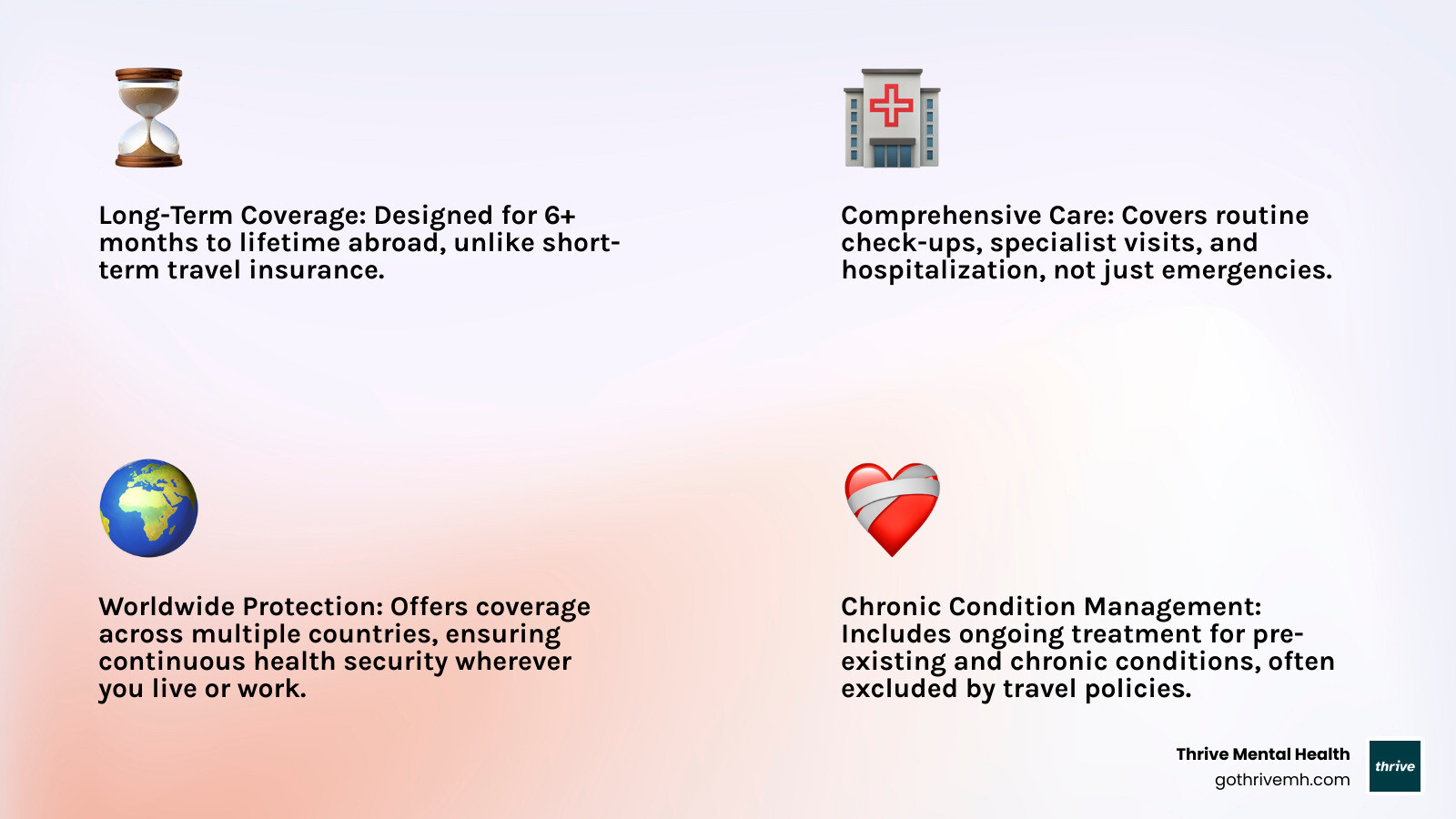International Health Insurance Coverage Explained Clearly

Why International Health Insurance Coverage Is Essential for Global Living
International health insurance coverage is specialized medical insurance for individuals living, working, or studying abroad for extended periods. For residents of a globally-connected state like Florida, this type of plan is particularly crucial. Unlike travel insurance, it provides comprehensive healthcare benefits, including routine care, chronic condition management, and emergency services across multiple countries. Key features include long-term protection (6+ months), comprehensive medical care, worldwide geographic coverage, medical evacuation, and ongoing treatment for chronic conditions.
The average annual cost ranges from $500 to over $10,000, depending on age, coverage area, and selected benefits. For example, individuals aged 18-24 pay approximately $2,342 per year, while those 65+ pay around $10,650 annually.
This coverage is essential for expatriates, digital nomads, international students, retirees abroad, and global professionals. Many countries also require proof of health insurance for visa applications.
I’m Nate Raine, and my leadership roles in healthcare innovation and behavioral health have shown me how critical proper international health insurance coverage is for accessing quality care abroad. Understanding your coverage options is essential for maintaining physical and mental well-being while living internationally.

Explore more about international health insurance coverage:
What Is International Health Insurance and Who Needs It?
When you move abroad for a job or retirement, the question of healthcare becomes critical. This is where international health insurance coverage becomes your safety net.
Unlike short-term travel insurance, international health insurance coverage is designed for long-term stays. It offers comprehensive protection that covers everything from annual check-ups to emergency surgery and ongoing treatment for chronic conditions like diabetes or heart disease. It’s a health plan that works across borders, ensuring you can see a specialist in Singapore or be hospitalized in Sweden.
In a globally connected state like Florida, this protection is essential for:
- Expatriates who have relocated for work or lifestyle changes.
- Digital nomads who work remotely while traveling the world.
- International students who often need it to meet university or visa requirements.
- Retirees abroad who require reliable healthcare access as they age.
- Global professionals on long-term assignments who need seamless medical care.

International Health Insurance vs. Travel Insurance: A Clear Distinction
Many people confuse international health insurance coverage with travel insurance, but they serve very different purposes. Travel insurance is for short trips, covering medical emergencies like a broken bone or food poisoning. Once your trip ends, so does the coverage.
International health insurance coverage is a long-term, renewable, and comprehensive solution for living abroad. It’s designed to be your primary healthcare plan, covering a wide range of services beyond just emergencies. The table below highlights the key differences.
| Feature | International Health Insurance | Travel Insurance |
|---|---|---|
| Duration | Long-term (6 months to lifetime), renewable annually | Short-term (days to a few months), per-trip basis |
| Medical Services | Comprehensive: routine care, specialist visits, chronic conditions, hospitalization, surgery, maternity, mental health | Primarily emergency medical care for sudden illness/injury, often with caps |
| Geographic Scope | Global or regional coverage, often excluding home country (or with an “exclude USA” option for cost savings) | Coverage for specific trip destinations |
| Pre-existing Conditions | May be covered after underwriting (moratorium or full medical) or with surcharges/exclusions | Often excluded or have very limited coverage |
| Purpose | Designed for individuals living abroad, providing ongoing health management | Designed for tourists, covering unforeseen medical emergencies and trip-related issues |
| Non-Medical Benefits | Limited, focuses on health | Often includes trip cancellation/interruption, lost luggage, flight delays |
| Ideal User | Expats, digital nomads, students, retirees, long-term assignees | Tourists, short-term business travelers, vacationers |
The main distinction is the scope of coverage. Travel insurance is for emergencies only and won’t cover routine care or chronic condition management. International health insurance coverage addresses ongoing health needs, including mental health support, recognizing that life continues even when you’re in another country.
Identifying Your Need for Global Health Protection
How do you know if you need international health insurance coverage? Several factors make it a necessity.
The six-month rule is a good guideline: if you plan to be outside your home country for more than six months, you’ve moved beyond the scope of travel insurance. Your domestic health plan likely offers little to no coverage abroad.
Visa requirements often mandate comprehensive health insurance for long-term stays, such as student, work, or retirement visas.
Furthermore, access to local public healthcare isn’t guaranteed. Many universal healthcare systems are reserved for citizens and permanent residents, leaving expats to face long waits or full costs in the public system. Without proper international health insurance coverage, a single emergency room visit or surgery in a private facility could be financially devastating.
For residents of Florida planning international moves, it’s important to understand how your current Individual Health Insurance interacts with global plans. As the Canadian government advises its citizens, provincial health plans offer minimal coverage abroad, making supplemental travel health insurance essential. The bottom line is clear: for extended stays abroad, this coverage is vital for your health and financial security.
Understanding Your International Health Insurance Coverage
Understanding your international health insurance coverage is key to feeling secure while living abroad. These plans are designed to be comprehensive, typically including core benefits like inpatient care, outpatient services, and emergency evacuation. The main advantage is flexibility; you can often customize your plan with optional add-ons to match your specific health needs.

Core Benefits and Common Inclusions
Most international health insurance coverage plans are built on a foundation of core benefits. Hospitalization covers your room, nursing care, and other hospital services. Surgery, including major operations and day-case procedures, is also typically included.
Comprehensive plans provide robust cancer treatment coverage, from diagnostics to chemotherapy and radiotherapy. While maternity care often has a waiting period, many plans cover childbirth, complications, and newborn care. Essential diagnostic tests like X-rays and MRIs are usually covered, as are prescription drugs, though often with specific limits. The portability of these benefits is a major advantage, ensuring your healthcare services travel with you.
For a deeper dive, you can review resources like What does international health insurance cover?. Always check your specific Insurance Policy to understand your exact terms.
Navigating Pre-Existing and Mental Health Conditions
A major concern for many is how international health insurance coverage handles pre-existing conditions—any health issue diagnosed or treated before your policy begins.
Insurers use two main approaches. Moratorium underwriting is simpler upfront, with no detailed medical questionnaire. However, pre-existing conditions are excluded for an initial period (usually 12-24 months) and may be covered later if you remain symptom-free. Full medical underwriting requires you to complete detailed health questionnaires. The insurer then offers coverage that may include exclusions or higher premiums but provides certainty from day one. Waiting periods are also common for benefits like maternity care.
Mental health coverage is increasingly recognized as essential. Living abroad can be stressful due to culture shock, isolation, and language barriers. Comprehensive international health insurance coverage plans often include therapy coverage, psychiatric treatment, and even inpatient psychiatric care. Some insurers now offer virtual mental health support, though it’s important to verify that your plan is accepted by providers.
At Thrive Mental Health, a Florida-based leader in mental wellness, we know that maintaining mental wellness abroad requires accessible care. Our Virtual IOP Insurance options are designed to work with various plans, and you can learn more about the Benefits of Health Insurance Covering Mental Health Services.
The Financials: Costs, Claims, and Choosing a Plan
For Floridians preparing for life abroad, understanding the financial side of international health insurance coverage is crucial. This involves navigating premiums, deductibles, co-pays, and the claims process to protect both your health and your finances while living abroad. Once you grasp these components, you can confidently choose a plan that fits your needs.

Factors That Influence the Cost of International Health Insurance Coverage
The cost of international health insurance coverage can vary significantly, from around $500 to over $10,000 annually. Understanding the key cost drivers helps you make informed choices.
- Age: This is the biggest factor. As we age, healthcare needs typically increase. A 22-year-old might pay around $2,342 annually, while someone over 65 could see premiums of $10,650 or more.
- Coverage Area: Geography matters. Plans that exclude the United States are significantly cheaper due to the high cost of American healthcare. Global healthcare spending varies widely, as shown in OECD health spending data.
- Deductible: A higher deductible leads to a lower monthly premium, but you’ll pay more out-of-pocket for care. It’s a trade-off between monthly affordability and potential upfront costs.
- Plan Tier and Medical History: Basic plans cover essentials, while premium plans are more comprehensive. Pre-existing conditions can also lead to higher premiums or specific waiting periods.
Exploring Affordable Health Plans can offer strategies for balancing cost and coverage.
A Step-by-Step Guide to Choosing and Using Your Plan
Choosing the right international health insurance coverage can be straightforward if you follow a few steps.
- Assess Your Needs: Consider where you’ll live, the duration of your stay, your current health, and your budget.
- Compare Plans: Look beyond the premium. Examine coverage details for mental health, maternity care, and routine check-ups. Check for direct billing networks in your area to avoid paying upfront.
- Understand Underwriting: Insurers use either moratorium underwriting (no initial health questions, but a waiting period for pre-existing conditions) or full medical underwriting (detailed health questionnaire for upfront clarity on coverage).
- Prepare for Claims: Know your insurer’s claims process. Most use online portals. Keep detailed receipts and medical reports, and submit claims promptly.
- Know the Reimbursement System: Some providers offer direct billing, while others require you to pay and get reimbursed. Confirm which system your plan uses.
- Consider a Broker: A specialized broker can compare plans from multiple insurers based on your needs, often at no cost to you, as they are paid by the insurance companies.
For more guidance, our guide on How to Get Health Insurance offers additional insights.
Navigating Global Healthcare Systems with Your Coverage
Having international health insurance coverage is one thing; using it effectively across different healthcare systems is another. Each country’s system is unique, but quality insurance plans provide support to help you steer these differences. Many offer 24/7 multilingual helplines to help you find approved providers, understand local procedures, and arrange direct billing.
Healthcare quality varies globally. Your insurance plan typically provides access to a network of pre-approved providers who meet specific quality standards. Direct billing networks are especially valuable, as they allow providers to bill your insurer directly, saving you from large upfront payments. Telehealth services are also becoming a standard feature, offering virtual consultations that bridge geographical gaps and provide consistent care.

Eligibility and the Application Process for International Health Insurance Coverage
To get international health insurance coverage, you must meet certain eligibility requirements and complete an application.
- Residency Status: Most plans require you to live outside your home country for at least three to six months per year.
- Age Limits: Providers have different age limits for new applicants, with some offering lifelong coverage and others stopping enrollment around age 74.
- Medical Questionnaire: You must provide a detailed and honest account of your health history. Accurate information is crucial to prevent claim denials later.
- Underwriting and Issuance: The insurer’s medical team will review your application, which can take several business days. Once approved, you’ll receive your policy documents and ID cards, often accessible through an online portal.
We work with various Insurance Companies and can help guide you through their different application processes.
How Coverage Varies by Destination
Your international health insurance coverage experience will differ based on your location.
High-cost countries like the United States, UK, and Singapore will result in higher premiums, but this often corresponds with access to advanced medical facilities.
In countries with universal healthcare systems (e.g., Canada, UK), you may not be immediately eligible for public benefits as a non-resident. Even if you are, you could face long wait times for non-emergency procedures. Your international plan is crucial for accessing private care and avoiding these delays.
For Floridians returning from abroad, it’s important to plan for a smooth transition back to a domestic plan to avoid coverage gaps. Providers like Florida Blue offer International Travel Health Insurance Plans in Florida that can serve as a bridge. At Thrive Mental Health, our virtual programs complement your coverage by providing consistent mental health support, no matter where you are.
Frequently Asked Questions about International Health Insurance
When considering international health insurance coverage, many common questions arise. Living abroad presents unique situations, and it’s natural to seek clarity on how your insurance will function when you need it. Here are answers to some of the most frequent concerns.
Can I get coverage for my family or dependents?
Yes, most international health insurance coverage plans are designed for families. You can typically add a spouse and dependent children to your policy, which is often more cost-effective than buying individual policies. Many insurers offer family discounts. Each family member will undergo the same underwriting process, with premiums based on their age, health, and country of residence.
What happens if I need to be medically evacuated?
Medical evacuation coverage is a crucial benefit included in most comprehensive plans. If you suffer a serious injury or illness in a location without adequate medical facilities, this benefit covers the cost of transporting you to the nearest suitable hospital. In severe cases, it may cover evacuation back to your home country. These costs can be extremely high, so this coverage provides essential protection. Some policies also include repatriation of remains.
Does international health insurance cover dental and vision?
Standard international health insurance coverage plans typically focus on medical care and do not include routine dental or vision services. However, these can almost always be added as optional benefits for an additional premium. If you require regular dental work, wear glasses, or want more comprehensive protection, it’s worth asking about these add-ons when comparing plans.
Living internationally can also present mental health challenges. As a Florida-based provider, Thrive Mental Health understands the importance of continuous care. Our flexible virtual programs are designed to complement your physical health coverage, offering Floridians abroad essential mental health care that is accessible from anywhere in the world.
Conclusion: Securing Your Health and Peace of Mind Abroad
Living abroad is an incredible journey, but it requires responsible planning. International health insurance coverage is the foundation that allows you to accept a global lifestyle with confidence, knowing you’re protected against health-related uncertainties.
This guide has shown that this coverage is far more than travel insurance. It’s about securing access to routine care, specialist visits, and mental health support. We’ve covered how factors like age and destination impact costs and why understanding policy details is crucial.
The reality of global mobility is that your health needs, both physical and mental, travel with you. The stress of relocation, culture shock, and isolation can take a toll. At Thrive Mental Health, we understand that maintaining your mental well-being is just as important as your physical health. Our flexible, virtual programs provide expert-led care that fits your international lifestyle, because sometimes the most critical support is having someone to talk to.
Your health security abroad is an investment in your freedom. It transforms worry into peace of mind. For those in Florida planning an international journey or returning home, ensuring continuous coverage is key. You can learn more by exploring our A Comprehensive Guide to Aetna, Florida Blue, and Evernorth Plans.
International health insurance coverage empowers you to live your best life, wherever that may be. Your health is the one passport that never expires.